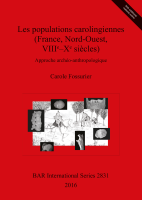Description
Les populations des VIIIe-Xe siècles du nord-ouest de la France peuvent être analysées grâce à l'étude de leurs ossements. Pour ceci, la mise en pratique de l'anthropologie biologique (sexe, âge, santé, activité) nécessite une méthodologie rigoureuse et des critères nettement définis détaillés ici. La mise au point de nouvelles méthodes permettant des analyses spécifiques aux informations recherchées est proposée. Les sites archéologiques du corpus correspondent à des situations variées du point de vue de l'environnement et la topographie religieuse. La détermination de leur recrutement mais aussi l'étude de leur état sanitaire et de leur niveau d'activité donne la possibilité de les caractériser et de proposer des hypothèses sur leur nature. Ces données, confrontées aux études menées d'après les sources écrites et archéologiques, donnent alors une image précise des populations carolingiennes, permettent de comparer les divers ensembles funéraires et illustrent ainsi la grande variété mais aussi la hiérarchisation partielle des groupes populationnels carolingiens. The 8th to 10th century populations of the north-west of France can be better understood through the analysis of human remains. If biological anthropology is to be used for this purpose (to determine sex, age, health and activity level), it needs a rigorous methodology and clearly defined standards. The development of new methods of analysis specific to the research data is proposed in this volume. The archaeological sites of the corpus correspond to a variety of environmental, topographical and cultural contexts. Analysis of the selection (or acceptance) of individuals for burial at these sites and the study of their state of health and level of activity makes it possible to characterise the populations, and to suggest hypotheses about their origins. These methods, in comparison with studies of archaeological and written sources, can thus grant us a clear picture of Carolingian populations. The data allow us to compare various burial situations and thus to illustrate the large variety, but also the partially hierarchical organisation, of Carolingian population groups.
AUTHORCarole Fossurier a soutenu sa thèse en civilisation médiévale à l'université de Poitiers. Elle a écrit plusieurs articles essentiellement sur les pratiques funéraires en France. Elle travaille actuellement à l'Inrap (Institut National de Recherches Archéologiques Préventives) au centre archéologique de Dijon (France, Bourgogne) en tant qu'archéo-anthropologue et est chercheur associé à l'UMR 7268 AMU, CNRS, EFS.Carole Fossurier defended a doctorate in medieval civilisation at the University of Poitiers. She has written several articles, mainly on funeral practices in France. She works at Inrap (Institut National de Recherches Archéologiques Préventives) at the archaeological centre of Dijon (Burgundy, France) as 'archaeo-anthropologist' and is an associate researcher at UMR 7268 AMU, CNRS, EFS.REVIEW
'This work's contribution to our knowledge of the Carolingian society is undeniable. Fossurier has laid the foundations of a study protocol which will certainly be used as a model for future studies.' Anonymous reviewer 'This work is innovative in its palaeopathological approach and has the advantage of being a successful synthesis that will serve as reference for the contemporary or future study of burial sites in the North West of France and beyond.' Dr Aminte Thomann, Institut National de Recherches Archéologiques Préventives 'This work is, at present, the first synthesis about the quality of life of the Carolingian people in North-Western Gaul, and the palaeopathological approach, still undeveloped in a lot of anthropological studies, is clearly a new and important approach to develop for the understanding of ancient populations and excavated burial sites.' Dr Aminte Thomann, Institut National de Recherches Archéologiques Préventives '[Fossurier's work] is an innovative synthesis in its palaeopathological approach and very useful for many researchers to better apprehend early medieval populations, largely unknown.' Dr Aminte Thomann, Institut National de Recherches Archéologiques Préventives.











